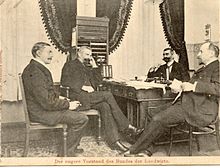Conrad von Wangenheim

Ulrich Conrad Freiherr von Wangenheim (born September 17, 1849 in Neu-Lobitz, Dramburg district ; † June 10, 1926 in Klein Spiegel , Saatzig district ) was a German agricultural politician and member of the Reichstag.
Life
Conrad von Wangenheim attended the Joachimsthal Gymnasium . He studied law at the Rheinische Friedrich-Wilhelms-Universität and became active in the Corps Hansea Bonn in 1869 . In 1870/71 he took part in the Franco-German War . Then he managed his Gut Klein Spiegel in the Saatzig district , where he earned merit in the development of the moor culture . In February 1893 he was one of the co-founders of the Bund der Landwirte (BdL), an agricultural interest group in which not only landowners but also the peasantry were strongly represented. The BdL chairman Berthold von Ploetz and Gustav Roesicke (both east Elbe landowners) made a significant contribution to making the BdL an influential lobby group. When Ploetz died in July 1898, von Wangenheim became BdL chairman and remained so until 1920. In 1913 he became chairman of the Pomeranian Chamber of Agriculture in Stettin . He was a member of the German Agriculture Council . In 1921 he brought the federal government into the Reichslandbund , which was created through the union of right-wing farmers' associations.
politics
He was elected to the Reichstag (German Empire) as a German Conservative in the Reichstag elections in 1898 and remained so for one legislative period. In autumn 1898 he was also elected a member of the Prussian House of Representatives. In 1921 he was elected chairman of the Pomeranian Provincial Parliament. In 1917 he joined the Pan-German and German Fatherland Party founded by Grand Admiral Tirpitz and other conservative politicians and worked together with Wolfgang Kapp and Heinrich Claß to build up their political apparatus. The party, an extra-parliamentary movement with a claim to the integration of all right-wing parties and associations, was a rallying group of opponents of a mutual agreement and led the fight against the peace resolution in opposition to the majority in the Reichstag . At its peak, in the summer of 1918, the party had over 1,250,000 members. In the Reich government, which Wolfgang Kapp, General Walther von Lüttwitz and their co-conspirators wanted to use in the so-called Kapp Putsch in March 1920, Conrad von Wangenheim was designated as Minister of Agriculture.
Honors
Incomplete list
- Wangenheimstrasse in Berlin-Grunewald (1891)
- Red Eagle Order IV class
- Crown Order III. class
- Iron cross on a white ribbon
- Cross of Honor of the Order of the Griffin
- Mecklenburg Military Merit Cross II. Class
- Knight 1st class of the Oldenburg House and Merit Order of Duke Peter Friedrich Ludwig
Fonts
- Inner colonization in: Philipp Zorn , Herbert von Berger (editor): Germany under Kaiser Wilhelm II. Ed. By Siegfried Körte , Friedrich Wilhelm von Loebell and others 3 volumes. R. Hobbing, Berlin 1914.
See also
- Wangenheim (noble family)
- List of members of the Reichstag of the German Empire (10th electoral term)
- List of corps students in the Reichstag of the German Empire
- List of corps students in the Prussian House of Representatives
literature
- Sigmund von Frauendorfer: History of ideas of agricultural economy and agricultural policy in the German-speaking area , Vol. 1, 2nd edition, BLV Verlagsgesellschaft, Munich / Basel / Vienna 1963, pp. 370–371.
- Hans von Wangenheim: Conrad Freiherr von Wangenheim . Pommersche Lebensbilder , Vol. 1. Saunier, Stettin 1934, pp. 351–369.
Web links
- Literature by and about Conrad von Wangenheim in the catalog of the German National Library
- Newspaper article about Conrad von Wangenheim in the 20th century press kit of the ZBW - Leibniz Information Center for Economics .
- Conrad von Wangenheim in the database of members of the Reichstag
- Klein Spiegel (Saatzig home district)
Individual evidence
- ↑ Heinz Wegener: The Joachimsthalsche Gymnasium - the State School Templin. Berlin Story Verlag, 2007, ISBN 3-929829-62-2 , pp. 511f. ( Google books )
- ↑ Kösener Corpslisten 1960, 11 , 187
- ↑ a b c Conrad von Wangenheim in the online version of the edition files of the Reich Chancellery. Weimar Republic
- ^ A b Bert Becker: Revolution and right-wing collection: The German National People's Party in Pomerania 1918/19. In: Siegfried Bahne, Bert Becker, Horst Lademacher (eds.): Spirit and shape in historical change. Facets of German and European History 1789–1989. Festschrift for Siegfried Bahne. Waxmann, 2000, ISBN 978-3-89325-849-9 , p. 213 ( online at Google Books ).
- ↑ Orders and their order according to the manual for the German Empire. 1918, p. 215 ( digitized from HathiTrust )
| personal data | |
|---|---|
| SURNAME | Wangenheim, Conrad von |
| ALTERNATIVE NAMES | Wangenheim, Ulrich Conrad Freiherr von (full name) |
| BRIEF DESCRIPTION | German landowner and agricultural politician, MdR |
| DATE OF BIRTH | September 17, 1849 |
| PLACE OF BIRTH | Neu-Lobitz, Dramburg district |
| DATE OF DEATH | June 10, 1926 |
| Place of death | Small mirror , circle Saatzig |